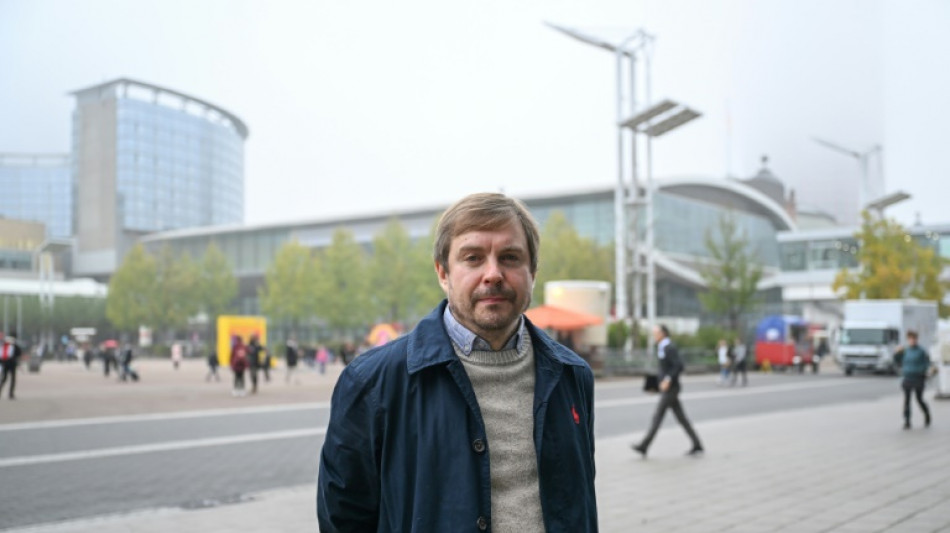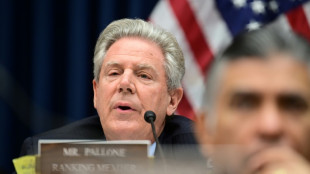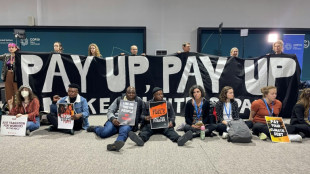
-
 US lawmaker accuses Azerbaijan in near 'assault' at COP29
US lawmaker accuses Azerbaijan in near 'assault' at COP29
-
Tuchel's England have 'tools' to win World Cup, says Carsley

-
 Federer hails 'historic' Nadal ahead of imminent retirement
Federer hails 'historic' Nadal ahead of imminent retirement
-
Ukraine vows no surrender, Kremlin issues nuke threat on 1,000th day of war

-
 Novo Nordisk's obesity drug Wegovy goes on sale in China
Novo Nordisk's obesity drug Wegovy goes on sale in China
-
Spain royals to visit flood epicentre after chaotic trip: media

-
 French farmers step up protests against EU-Mercosur deal
French farmers step up protests against EU-Mercosur deal
-
Rose says Europe Ryder Cup stars play 'for the badge' not money

-
 Negotiators seek to break COP29 impasse after G20 'marching orders'
Negotiators seek to break COP29 impasse after G20 'marching orders'
-
Burst dike leaves Filipino farmers under water

-
 Markets rally after US bounce as Nvidia comes into focus
Markets rally after US bounce as Nvidia comes into focus
-
Crisis-hit Thyssenkrupp books another hefty annual loss

-
 US envoy in Lebanon for talks on halting Israel-Hezbollah war
US envoy in Lebanon for talks on halting Israel-Hezbollah war
-
India to send 5,000 extra troops to quell Manipur unrest

-
 Sex, drugs and gritty reality on Prague's underworld tours
Sex, drugs and gritty reality on Prague's underworld tours
-
Farmers descend on London to overturn inheritance tax change

-
 Clippers upset Warriors, Lillard saves Bucks
Clippers upset Warriors, Lillard saves Bucks
-
Acquitted 'Hong Kong 47' defendant sees freedom as responsibility

-
 Floods strike thousands of houses in northern Philippines
Floods strike thousands of houses in northern Philippines
-
Illegal farm fires fuel Indian capital's smog misery

-
 SpaceX set for Starship's next flight, Trump expected to attend
SpaceX set for Starship's next flight, Trump expected to attend
-
Texans cruise as Cowboys crisis deepens

-
 Do the Donald! Trump dance takes US sport by storm
Do the Donald! Trump dance takes US sport by storm
-
Home hero Cameron Smith desperate for first win of 2024 at Australian PGA

-
 Team Trump assails Biden decision on missiles for Ukraine
Team Trump assails Biden decision on missiles for Ukraine
-
Hong Kong court jails 45 democracy campaigners on subversion charges

-
 Several children injured in car crash at central China school
Several children injured in car crash at central China school
-
Urban mosquito sparks malaria surge in East Africa

-
 Djibouti experiments with GM mosquito against malaria
Djibouti experiments with GM mosquito against malaria
-
Pulisic at the double as USA cruise past Jamaica

-
 Many children injured after car crashes at central China school: state media
Many children injured after car crashes at central China school: state media
-
Asian markets rally after US bounce as Nvidia comes into focus

-
 Tens of thousands march in New Zealand Maori rights protest
Tens of thousands march in New Zealand Maori rights protest
-
Five takeaways from the G20 summit in Rio

-
 China, Russia ministers discuss Korea tensions at G20: state media
China, Russia ministers discuss Korea tensions at G20: state media
-
Kohli form, opening woes dog India ahead of Australia Test series

-
 Parts of Great Barrier Reef suffer highest coral mortality on record
Parts of Great Barrier Reef suffer highest coral mortality on record
-
Defiant Lebanese harvest olives in the shadow of war

-
 Russian delegations visit Pyongyang as Ukraine war deepens ties
Russian delegations visit Pyongyang as Ukraine war deepens ties
-
S.Africa offers a lesson on how not to shut down a coal plant

-
 Italy beat Swiatek's Poland to reach BJK Cup final
Italy beat Swiatek's Poland to reach BJK Cup final
-
Japan, UK to hold regular economic security talks

-
 Divided G20 fails to agree on climate, Ukraine
Divided G20 fails to agree on climate, Ukraine
-
Can the Trump-Musk 'bromance' last?

-
 US to call for Google to sell Chrome browser: report
US to call for Google to sell Chrome browser: report
-
Macron hails 'good' US decision on Ukraine missiles

-
 Italy eliminate Swiatek's Poland to reach BJK Cup final
Italy eliminate Swiatek's Poland to reach BJK Cup final
-
Trump expected to attend next Starship rocket launch: reports

-
 Israeli strike on Beirut kills 5 as deadly rocket fire hits Israel
Israeli strike on Beirut kills 5 as deadly rocket fire hits Israel
-
Gvardiol steals in to ensure Croatia reach Nations League quarter-finals


Dissident author warns Russians in Europe to be on guard
Russian author Sergei Lebedev's novel "Untraceable", about an undetectable toxin used to target Kremlin critics, was released a few years ago but has taken on added resonance as alleged poisonings have multiplied.
Now the dissident writer is warning that the Russian exile community in Europe faces an ever greater threat amid heightened tensions over the Ukraine war.
"This emigre community in Europe is now one of the most important targets for the Russian security (services)," the 42-year-old, now based in Germany, told AFP in an interview at the Frankfurt Book Fair this week.
"There will be attempts to infiltrate, to get informants... Of course, there will be some assassination attempts."
In Germany -- which Lebedev describes as a "hub" for overseas Russians -- there have been a growing number of suspected cases of Kremlin critics being targeted.
In May, German police said they were investigating the possible poisoning of exiled Russians after an activist, Natalia Arno, reported health problems following a Berlin meeting of dissidents.
Meanwhile, Berlin-based Russian journalist Elena Kostyuchenko wrote in a Guardian article last month about how she fell ill last year after visiting Munich, and poisoning was suspected.
Inside Russia, the most high-profile case in recent years of a Kremlin critic allegedly being poisoned was that of opposition politician Alexei Navalny.
Moscow has repeatedly dismissed allegations that it has targeted critics in this way.
But Western governments say evidence points to the contrary and for Lebedev, Russians in Europe are not taking the threat seriously enough.
- 'Very eerie' -
"They are not very much concerned with security," he said.
"They do not understand the principles of how the security services work."
"Untraceable", which tells the story of an ageing scientist who creates a highly toxic, undetectable poison, was inspired by the 2018 poisoning of former double agent Sergei Skripal in Salisbury, England.
And it was around the time that the book was published in Russia that opposition politician Navalny was allegedly poisoned -- a development that Lebedev said he found "very eerie".
While he has been vocal about his opposition to Russia's invasion of Ukraine, he does not believe he faces a threat himself.
He has not found himself in the crosshairs of the authorities and feels he does not run the same level of risk as others, such as critical journalists, particularly those still trying to report from inside Russia.
Still, Lebedev -- who moved to Germany five years ago with his wife -- said he has been taking extra precautions, particularly when it comes to exchanging sensitive information.
Before becoming a full-time writer, Lebedev worked as a geologist and later as a journalist.
He was motivated to write a novel after discovering his grandmother's second husband had been the commander of a Soviet labour camp.
He was shaken by the revelation and faced the question of how to "deal with this personally -- with the fact that in your family (there) was a murderer".
"I realised that the way out was to write a novel."
- 'Shocked' at Ukraine war -
The result was the book "Oblivion", about the legacy of the Soviet prison camp system, which was released about a decade ago and launched his literary career.
He has since written several books and his latest is a collection of short stories, "A Present Past: Titan and Other Chronicles".
It reflects what he believes is Russia's tortured relationship with the Soviet era -- and society's failure to come to terms with the past -- as well as aspects of its problematic present.
Lebedev, who lives in Potsdam outside Berlin, did not flee his homeland. He first moved to Germany for professional reasons.
But he has not returned since Russia's invasion of Ukraine, fearing it is not safe to do so.
He said he was "shocked" when Moscow sent its forces into Ukraine.
"I was the same idiot as many of us were, thinking that Putin is a... modern autocratic, modern dictator and not the blood-thirsty maniac that he is."
He sees no swift end to the conflict.
"The most difficult and problematic thing is that Russians are getting used to the fact that they are at war but still life is sustainable," he said.
A.Anderson--AT



